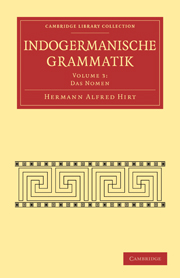Book contents
- Frontmatter
- Vorwort
- Contents
- Einleitung
- I Die Interjektionen
- II Die Partikeln
- III Die Fürwörter. Pronomina
- IV Das Nomen und seine Flexiou
- V Suffix- und Kasusbildung. Die Determinativa
- VI Die Entstehung der Flexion
- VII Die Sufflxbildung. Suffixe aus selbständigen Worten und sonstige Suffixe
- VIII Suffixe durch falsche Abstraktion
- IX Die Wurzeldeterminativa
- X Die Adjektiva
- XI Die Steigerung
- XII Die Adverbia
- XII Die Zahlwörter
- XIV Das grammatische Geschlecht
- Autorenverzeichnis
- Sachverzeichnis
- Wörterverzeichnis
- Berichtigungen
II - Die Partikeln
Published online by Cambridge University Press: 29 August 2010
- Frontmatter
- Vorwort
- Contents
- Einleitung
- I Die Interjektionen
- II Die Partikeln
- III Die Fürwörter. Pronomina
- IV Das Nomen und seine Flexiou
- V Suffix- und Kasusbildung. Die Determinativa
- VI Die Entstehung der Flexion
- VII Die Sufflxbildung. Suffixe aus selbständigen Worten und sonstige Suffixe
- VIII Suffixe durch falsche Abstraktion
- IX Die Wurzeldeterminativa
- X Die Adjektiva
- XI Die Steigerung
- XII Die Adverbia
- XII Die Zahlwörter
- XIV Das grammatische Geschlecht
- Autorenverzeichnis
- Sachverzeichnis
- Wörterverzeichnis
- Berichtigungen
Summary
9. Allgemeines. Unter Partikeln (l. particulae) versteht man unflektierte Elemente der Sprache, wie Konjunktionen, Präpositionen, Adverbien. Der Begriff ist schwankend. Im folgenden sollen nur die kürzesten Elemente des Indogerm. zusammengestellt werden, weil diese eine wichtige Rolle beim Aufbau der idg. Flexion gespielt haben.
Sicher sind die Partikeln z. T. aus flektierten Formen entstanden, wie gr. ἄγ∈ ‘wohlan’ ἔϕ∈λον ‘o daß doch’, l. age ‘wohlan’, d. halt, gelt. Daneben gibt es zweifellos auch uralte flexionslose Elemente, die nicht selten mit den Pronominalstämmen zusammengehören. Dieser Zusammenhang kann so verstanden werden, daß die Partikeln erstarrte Pronominalformen sind, aber auch, daß sich die Pronomina aus den Partikeln entwickelt haben. Das hat man bisher selten angenommen, weil man die Flexion als das ältere ansah und daher immer die Partikeln als erstarrte Pronomina auffaßte. Aber diesen Standpunkt muß man verlassen. Es gibt auch uralte flexionslose Elemente.
Anm. Eine Partikel i z. B. könnte als eine Form des Verbums ei ‘gehen’ aufgefaßt, aber auch umgekehrt das Verbum ei ‘gehen’, l. īre von der Partikel abgeleitet werden. Wir lassen uns darauf nicht weiter ein und betrachten hier die Partikeln, soweit sie flexionslose, uralte Elemente der Sprache zu sein scheinen.
Viele Partikeln sind außerordentlich kurz gewesen. Sie sind es offenbar im Laufe der Zeit geworden. Nach einem allgemeinen Gesetz der sprachlichen Entwicklung werden solche kurzen Sprachelemente durch angefügte oder vorgesetzte andere Bestandteile sozusagen gestützt und bekommen dadurch einen größeren Umfang.
- Type
- Chapter
- Information
- Indogermanische Grammatik , pp. 9 - 20Publisher: Cambridge University PressPrint publication year: 2009First published in: 1927



